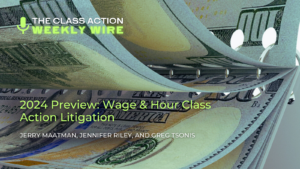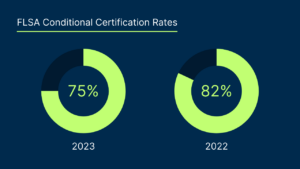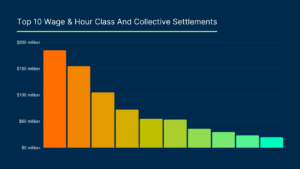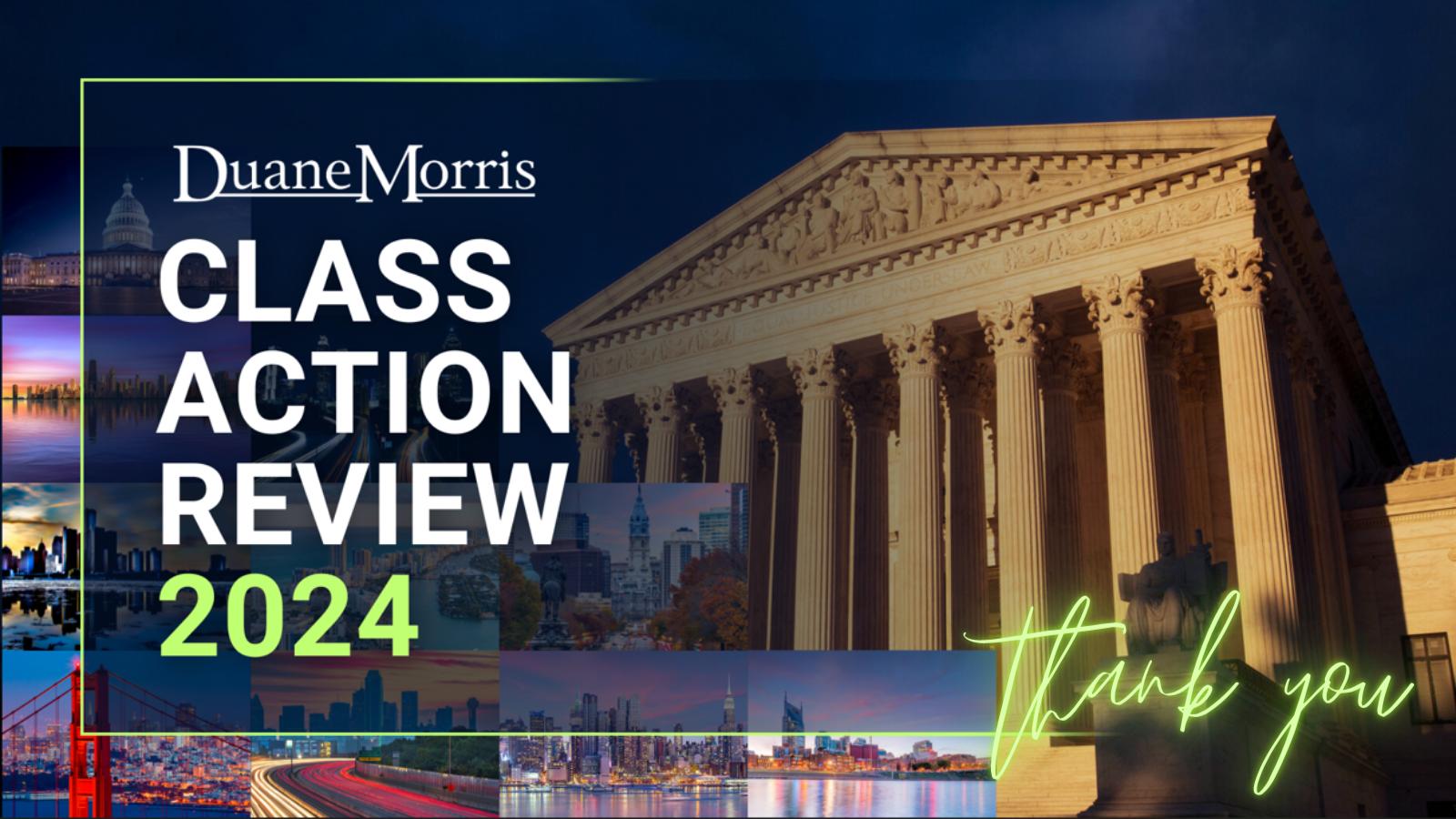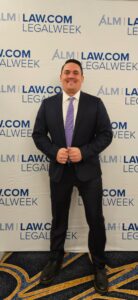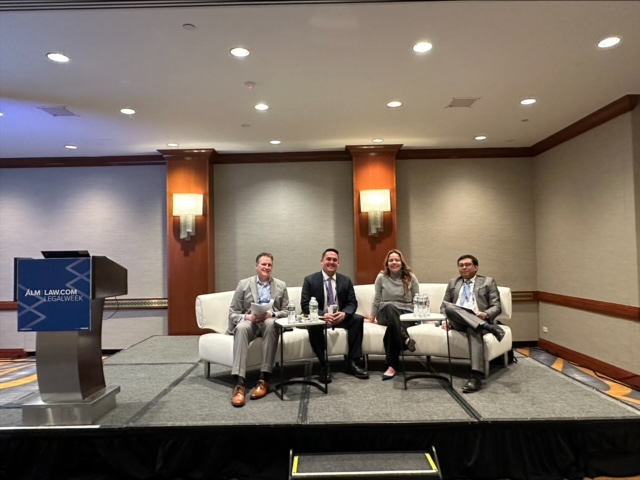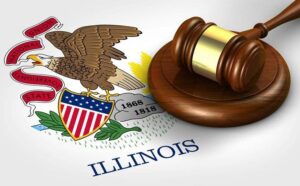Duane Morris Takeaway: This week’s episode of the Class Action Weekly Wire features Duane Morris partners Jerry Maatman and Jennifer Riley and associate Greg Tsonis with their discussion of wage & hour class and collective action litigation over the past 12 months as detailed in the recently published Duane Morris Wage & Hour Class And Collective Action Review – 2024.
Check out today’s episode and subscribe to our show from your preferred podcast platform: Spotify, Amazon Music, Apple Podcasts, Google Podcasts, the Samsung Podcasts app, Podcast Index, Tune In, Listen Notes, iHeartRadio, Deezer, YouTube or our RSS feed.
Episode Transcript
Jerry Maatman: Welcome back, loyal podcast listeners. Thank you for being here for our kickoff 2024 podcast for our weekly series entitled The Class Action Weekly Wire. I’m Jerry Maatman of Duane Morris, joining me today is my partner Jennifer Riley and our colleague Greg Tsonis. Thank you Jen and Greg for being on our kickoff podcast!
Jennifer Riley: Thank you, Jerry. Happy to be part of the first Weekly Wire podcast of 2024.
Greg Tsonis: Thanks, Jerry. I’m glad to be here.
Jerry: Today on our podcast we’re discussing the recent publication of this year’s edition of the Duane Morris Wage & Hour Class And Collective Action Review. Listeners can find this eBook publication on our blog, the Duane Morris Class Action Defense Blog. Jen, can you tell our listeners a little bit about this publication?
Jennifer: Absolutely, Jerry. The purpose of the Duane Morris Wage & Hour Class And Collective Action Review is really multi-faceted. We hope it will demystify some of the complexities of class and collective action litigation and keep corporate counsel updated on the ever evolving nuances of Rule 23 as well as FLSA collective action issues in this respect. We really hope that this book will provide our clients with an analysis of trends and significant rulings in the wage & hour space, and enable them to make informed decisions in dealing with complex litigation risks.
Jerry: Defense of wage & hour class and collective actions is really the hallmark of our defense group at Duane Morris, and on this call and the podcast today is over 65 years’ worth of collective experience in handling these types of cases. Greg, what are some of the collective experiences and sort of desk reference attributes of this publication in terms of what’s going on in the wage in our world for 2023 and 2024?
Greg: Well, Jerry, as you know, wage & hour litigation has long been a focus of the plaintiffs’ class action bar. The relatively low standard by which plaintiffs can achieve conditional certification under the FLSA, often paired with state law wage & hour class claims, offers a pretty potent combination by which plaintiffs can pursue alleged misclassification or unpaid overtime claims, for example. So this publication will definitely assist our clients by identifying developing trends in the case law and offering practical approaches for dealing with class and collective action litigation.
Jerry: Well, I know Greg and Jen – you’re the main contributors and authors of the book. Along with about 30 of our colleagues in our Class Action Defense Group. What are some of the takeaways from 2023, and what corporate counsel and employers can expect in 2024?
Greg: Great question. So in in 2023 courts once again issued more certification rulings and FLSA collective actions than in other types of cases. Plaintiffs historically have been able to obtain conditional certification of FLSA collective actions at a pretty high rate which definitely is contributed to the number of filings in this area.
Jennifer: Right, Greg – agreed. Despite the high number of certification motions decided, of the 167 rulings that were issued on motions for conditional certification – 125 rulings favored plaintiffs for a success rate of nearly 75%. Those numbers are actually lower than the numbers we observed in 2022, when plaintiffs had a success rate of nearly 82%. The decline in success rates in 2023 likely reflects the impact of rulings in the Fifth Circuit and the Sixth Circuit, which took a closer look at that so called two-step process of certification. The Review goes into this analysis, and what employers can expect moving into 2024.
Jerry: I’ve always thought in the wage & hour space that change is inevitable, and employers are struggling with keeping up with the changes. And what our clients tell me in particular, is that this book is an essential desk reference that they cite and look to at least once a week. And I think one of the key issues going on right now is the propensity of the plaintiffs’ bar to file lawsuits involving very highly compensated employees, those that bank over six figures a year. And intuitively, one would think those sorts of folks are not entitled to overtime. But one of the central focuses in this year’s book is the Supreme Court’s decision this past year in Helix v. Hewitt on the salary basis test and the exemption for highly compensated individuals that brings into focus another area that’s in the book, and that’s about settlements. How do plaintiffs do in terms of securing high level settlements over the past 12 months?
Greg: Well, plaintiffs did a very good job in securing high dollar settlements in 2023, particularly in the state of California. The top 10 wage & hour settlements in 2023 totaled $742.5 million dollars, and nine of those 10 settlements emanated from litigation in California. This total was a pretty significant increase over 2022, when the top 10 wage & hour settlements totaled almost $575 million dollars.
Jerry: Those numbers are rather stunning. My prognostication is for 2024 – I think for the first time ever – we’re going to see the top 10 wage & hour class and collective action settlements exceed $1 billion dollars.
Well, thanks, Jen and thanks, Greg for being here today on our kicked off podcast for 2024. Listeners, please stop by our Duane Morris Class Action Defense Blog to obtain a free copy of the Duane Morris Wage & Hour Class And Collective Action Review eBook.
Greg: Thank you for having me, Jerry, and thank you, listeners.
Jennifer: Thanks so much, everyone.

